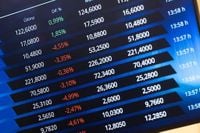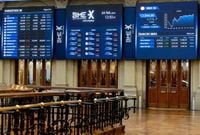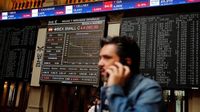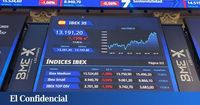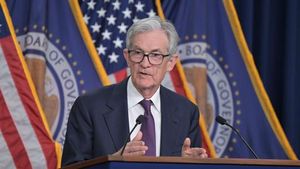The global financial markets are in turmoil following the announcement of aggressive tariffs by former President Donald Trump, leading to significant declines across major stock indices. On April 3, 2025, Wall Street witnessed its largest drop since March 2020, with the Nasdaq 100 plummeting by 5.4% and the S&P 500 dropping 4.8%. This downturn was particularly harsh on technology stocks, with Apple experiencing a staggering 9.2% decline, equating to a loss of $312 billion in market value, marking its biggest drop since the onset of the pandemic.
As the dust settled, investors turned their attention to Europe, where the fallout from these tariffs was palpable. The Spanish Ibex 35 index, which had managed to resist the initial wave of selling, fell dramatically by 4% on April 4, 2025, dropping to 12,700 points, its largest decline since March 15, 2023. This sharp decline was driven primarily by the banking sector, with major banks like Sabadell and BBVA suffering losses of 8% and 6%, respectively.
Peter van der Welle, a strategist at Robeco, remarked, "The tariff package was more aggressive and broad than the market expected, as both universal and reciprocal tariffs were announced, alongside a 25% tariff on all cars exported to the U.S." He further noted that the average effective tariff rate is projected to soar to 22%, a stark contrast to last year's rate of just 2.5%.
In the broader context, European markets mirrored the negative sentiment, with the German DAX down 2%, the French CAC losing 1.5%, and the Italian MIB falling by 3.5%. The economic implications of Trump's tariffs have raised fears of a recession, prompting investors to seek refuge in safer assets like bonds. The yield on the Spanish 10-year bond fell to 3.2%, while Germany's was at 2.55%.
Oil prices also reflected the market's anxiety, with Brent crude dropping by 2% to $68, marking a significant decline from previous highs. The uncertainty surrounding the tariffs has led to a cautious outlook among investors, with many bracing for further economic fallout.
On April 4, the Ibex 35 opened with a drop of 0.83%, reflecting ongoing concerns about the impact of the tariffs on economic growth. The index was already under pressure due to the fallout from the previous day's trading, where it had dipped below the critical 13,000-point mark. As the session progressed, the index continued to struggle, with losses accumulating as investors reacted to the broader economic landscape.
In the corporate sector, companies like Ferrovial expressed concerns that stricter import conditions could hinder their growth and profitability in the U.S. Despite this, Ferrovial remains committed to expanding its U.S. operations, having generated €3.271 billion in revenue last year and employing over 4,600 people.
The volatility in the markets has also affected the automotive sector significantly. Santander, one of the largest lenders in the U.S. automotive market, announced that it had improved its return on tangible equity to nearly 15.7% in the first quarter of 2025, despite the challenging environment. However, the bank's exposure to the U.S. market leaves it vulnerable to the impacts of the tariffs, particularly the 25% duty on imported vehicles.
As the day unfolded, the Ibex 35 continued to lead declines in Europe, with a notable drop in banking stocks. Analysts noted that the drastic measures taken by the Trump administration could lead to a prolonged period of economic uncertainty and potential recession. Tomasz Wieladek, Chief Economist for Europe at T. Rowe Price, warned, "The announcement of U.S. tariffs is one of the worst possible scenarios for the global economy and will likely force the European Central Bank to lower interest rates below neutral levels, to between 1% and 1.5%."
In anticipation of the U.S. employment report due later in the day, which is expected to show a net job creation of 135,000 in March, markets remained on edge. A weaker-than-expected report could exacerbate fears of a recession, while stronger data might alleviate some concerns. The unemployment rate is projected to remain at 4.1%, but any deviation from these expectations could significantly impact market sentiment.
As the financial world grapples with the implications of the tariffs and the potential for a recession, many investors are looking for safe havens. Gold prices have surged to historical highs, reflecting the flight to safety amidst the turmoil. Meanwhile, the volatility in the markets shows no signs of abating, as traders remain cautious ahead of key economic indicators and further developments in the ongoing trade tensions.
Overall, the situation underscores the fragility of the current economic climate and the interconnectedness of global markets. With uncertainty looming, investors are bracing for a turbulent period ahead, as the ramifications of Trump's tariffs continue to unfold.
